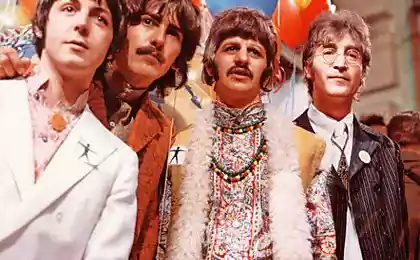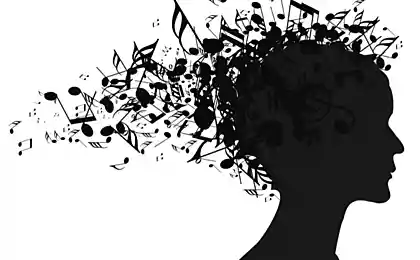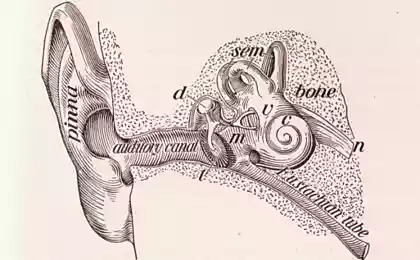990
Effects of music on people (11 photos)
Anyone who can not live without music, knows what it has enormous power over our thoughts and feelings. Musical masterpieces can turn an ordinary day into an unforgettable. In it you can find everything what your heart desires: and tranquility, and a storm of emotions.
Besides all this magic, music can heal the disease and affect our relationships with other people. According to recent studies, mellifluous sounds can help us learn how to clearer and clearer to express their thoughts, to cure disease, to see the colors more vivid and even see the happy faces on the street.

Become a good speaker and improve visual perception
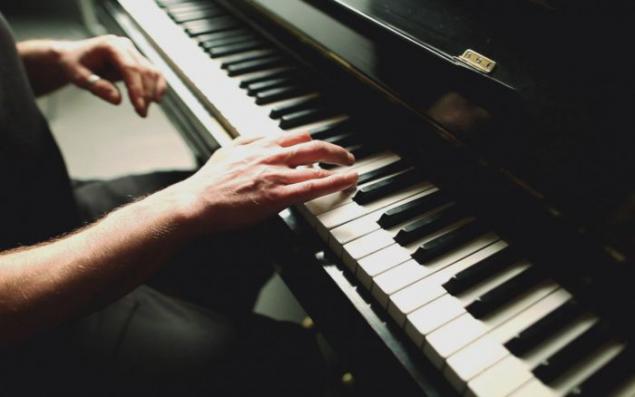
Playing the piano can help improve visual perception and improve speaking skills. The study, which involved children from 8 to 11 years, found that those children who go to a music school, a better command of the language, able to clearly express their thoughts and have a more developed visual perception. This proves that learning to play a musical instrument, you develop themselves not only musically.
ACFID effect or goose

At least once in the life of each of us felt chills running down his back, listening music composition. According to the survey, 90% of respondents at least once in his life felt by this effect. Are you so impressed by the music depends on the characteristics of your character. In one of the psychological models of personality "Big Five" one of the most important qualities of the person is the "openness to experience." People are more open experience, are more likely to feel those same chills, attach great importance to the music in their lives and, as a consequence, often addicted to playing the instrument.
Music as a source of happiness

If, however, you do not feel these mythical chills, then maybe you are trying weakly. A recent study showed that people who deliberately configured to receive good feelings, while listening to music at the end of the experiment really felt a rush of emotions than those who simply listened to the music of anything without thinking.
Singing together helps unite

When we sing, particularly in the company, and it unites us and reconciles. The experiment involved nearly 1,000 Finnish students who were engaged in choral singing at music lessons. At the end of the experiment the students admitted that they get more pleasure from the lessons, even from those who are very far from music. Choral singing - it is an integral part of the music lesson. Studies have shown that singing in chorus, lets you tune each participant at each other. It is at times reinforces the connection between the actors and improving relationships in the group.
Music heals heart disease

... Or at least significantly helps patients cope with the attendant stress and anxiety associated with the treatment of these diseases. In order to carefully examine this effect it was examined almost 1,500 patients whose music lowered heart rate, blood pressure, and also struggled with anxiety inherent cores.
The sad music uplifting

That control our moods - it is one of the many reasons why people listen to music. Music has a cleansing effect, it helps to release emotions. Therefore, as paradoxical as it may sound, but for some people sad music, under certain circumstances, it helps to improve mood. Conducted in 2013, Japanese scientists study showed that minor music provokes us to different emotions, bringing out all the negative music, bad emotions are left behind, or at least we do not feel them so much.
Music helps to see the happy faces

There is a relationship between what music you are currently listening to, and as you can see with the people around them. Just a brief excerpt groovy music makes you perceive other people's faces as happy, cheerful and happy life. With the sad music, things are the other way around: the people around perceived downcast, dejected, anxious problems.
Color music

In different cultures, people associate certain kinds of music with certain colors. Indeed music can make to "see" the human brain is a certain color. People tend to associate the sad music with a dark color scheme, while the light and merry seen in the light, and even rainbow. Long-term research has shown that these parallels music and color arise from the emotional content of a piece of music.
Music can restore sight
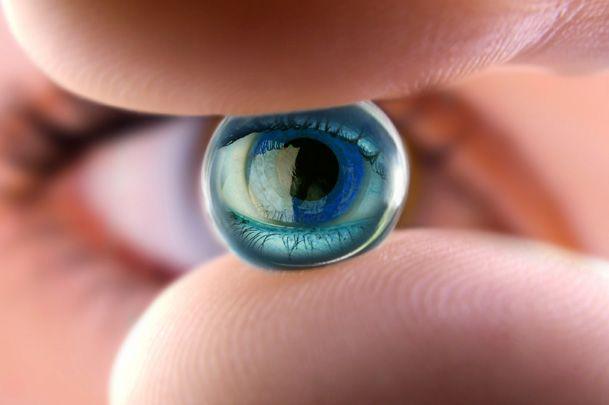
60% of people who have suffered a stroke, a brain area responsible for vision, most often affected. This leads to a deviation called "unilateral spatial variation" in which people with damage to the right side of the brain does not see the left part of the space and vice versa, respectively. Surprisingly, many studies have found: patients suffering from this disease, when listening to your favorite music can restore a small part of.
The response of infants to music
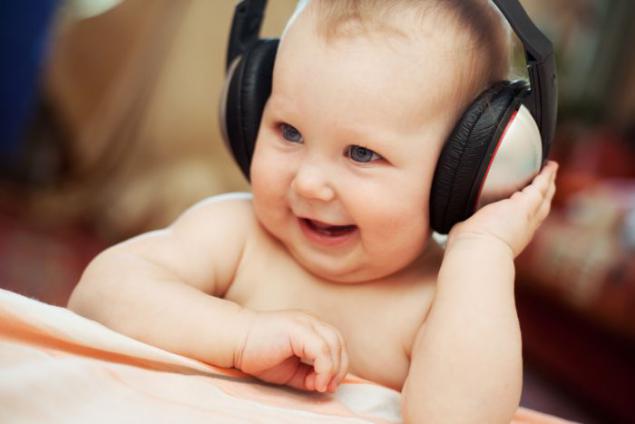
As early as five months of age children respond rhythmic movements to the music they hear. In experiments conducted children "dance" to the music of very different styles, and smiled. Can music really in our genes?
Besides all this magic, music can heal the disease and affect our relationships with other people. According to recent studies, mellifluous sounds can help us learn how to clearer and clearer to express their thoughts, to cure disease, to see the colors more vivid and even see the happy faces on the street.

Become a good speaker and improve visual perception

Playing the piano can help improve visual perception and improve speaking skills. The study, which involved children from 8 to 11 years, found that those children who go to a music school, a better command of the language, able to clearly express their thoughts and have a more developed visual perception. This proves that learning to play a musical instrument, you develop themselves not only musically.
ACFID effect or goose

At least once in the life of each of us felt chills running down his back, listening music composition. According to the survey, 90% of respondents at least once in his life felt by this effect. Are you so impressed by the music depends on the characteristics of your character. In one of the psychological models of personality "Big Five" one of the most important qualities of the person is the "openness to experience." People are more open experience, are more likely to feel those same chills, attach great importance to the music in their lives and, as a consequence, often addicted to playing the instrument.
Music as a source of happiness

If, however, you do not feel these mythical chills, then maybe you are trying weakly. A recent study showed that people who deliberately configured to receive good feelings, while listening to music at the end of the experiment really felt a rush of emotions than those who simply listened to the music of anything without thinking.
Singing together helps unite

When we sing, particularly in the company, and it unites us and reconciles. The experiment involved nearly 1,000 Finnish students who were engaged in choral singing at music lessons. At the end of the experiment the students admitted that they get more pleasure from the lessons, even from those who are very far from music. Choral singing - it is an integral part of the music lesson. Studies have shown that singing in chorus, lets you tune each participant at each other. It is at times reinforces the connection between the actors and improving relationships in the group.
Music heals heart disease

... Or at least significantly helps patients cope with the attendant stress and anxiety associated with the treatment of these diseases. In order to carefully examine this effect it was examined almost 1,500 patients whose music lowered heart rate, blood pressure, and also struggled with anxiety inherent cores.
The sad music uplifting

That control our moods - it is one of the many reasons why people listen to music. Music has a cleansing effect, it helps to release emotions. Therefore, as paradoxical as it may sound, but for some people sad music, under certain circumstances, it helps to improve mood. Conducted in 2013, Japanese scientists study showed that minor music provokes us to different emotions, bringing out all the negative music, bad emotions are left behind, or at least we do not feel them so much.
Music helps to see the happy faces

There is a relationship between what music you are currently listening to, and as you can see with the people around them. Just a brief excerpt groovy music makes you perceive other people's faces as happy, cheerful and happy life. With the sad music, things are the other way around: the people around perceived downcast, dejected, anxious problems.
Color music

In different cultures, people associate certain kinds of music with certain colors. Indeed music can make to "see" the human brain is a certain color. People tend to associate the sad music with a dark color scheme, while the light and merry seen in the light, and even rainbow. Long-term research has shown that these parallels music and color arise from the emotional content of a piece of music.
Music can restore sight

60% of people who have suffered a stroke, a brain area responsible for vision, most often affected. This leads to a deviation called "unilateral spatial variation" in which people with damage to the right side of the brain does not see the left part of the space and vice versa, respectively. Surprisingly, many studies have found: patients suffering from this disease, when listening to your favorite music can restore a small part of.
The response of infants to music

As early as five months of age children respond rhythmic movements to the music they hear. In experiments conducted children "dance" to the music of very different styles, and smiled. Can music really in our genes?





